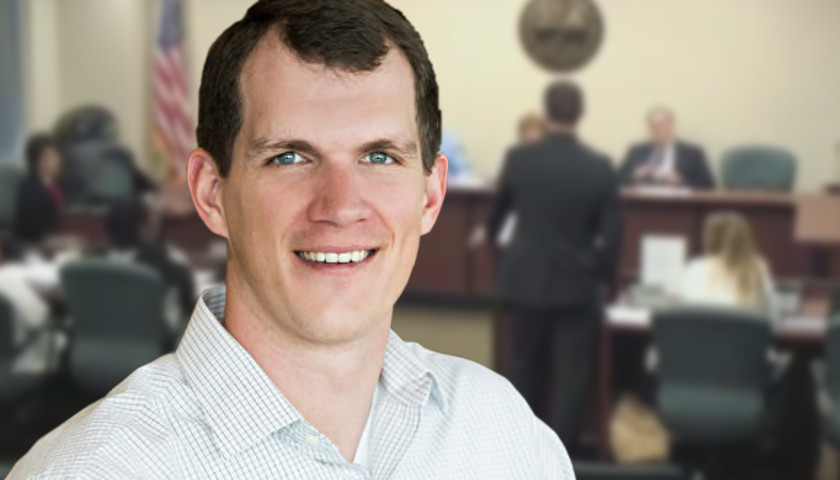Former soldier and inventor Adam Jackson developed a new facial recognition software called Edge AI that can instantly cross-check a camera’s video feed containing a person’s face with criminal databases, but an obscure government agency called the Tennessee Alarm Systems Contractors Board declared that because Jackson does not hold an “Alarm Contractors License” – a process, in this case, that takes five-years – he is not allowed sell or even donate his product in the Volunteer State.
Braden Boucek, Director of Litigation for the Beacon Center, who has taken the lead in fighting the Board’s decision in court said, “This cutting-edge facial recognition software could make a huge difference in the lives of vulnerable Tennesseans.”
He added:
“Technological solutions like Adam’s hold far more promise as an effective response to mass shootings than any restrictions on firearms ever could. This is a novel and effective response to gun violence, especially in schools, where his software has the capacity to screen out potential shooters before they enter the building. The state of Tennessee should be rolling out the red carpet for Adam. Unfortunately, we have a regulatory board more interested in protecting entrenched industries from emergent technology using archaic and poorly fitting regulations than protecting the public.”
This is despite local child care centers, schools, churches and synagogues, and concert venues clamoring for the technology.
“Given recent events in Charlottesville, school shootings, and a perceived uptick in violence and anti-Semitic hate crimes, we are interested in enhancing our existing security measures in an effort to protect both our members and children on our premises,” Daniel Horwitz, the spokesman of an interested synagogue, said in a statement. “We urgently await the outcome of the proceeding in the hopes that we will be able to utilize Edge AI’s promising security technology.”
In an interview with The Tennessee Star, Boucek explained that the Tennessee Alarm Contractors Board is comprised of five members, appointed by the Governor. Four of the five members are required to be a professional in the field of security alarms – generally meaning owners or significant stakeholders in established companies.
Detailed information about the Board is limited. In fact, according the Boucek, although the Board web page is still available online, navigation to it from the main TN.gov website has been disabled.
Due to an expensive appeal process and the threat of heavy monetary penalties should he go forward without a certain decision, Jackson took his lawyer’s advice and went before the Board in June of 2017 to ask whether or not his company was considered an “alarm company” requiring licensure.
Watch his appearance here (cued at the moment Jackson took the podium at 51:50min mark; the discussion begins in earnest at about 59min)
In his meeting with the Board, they asked several questions regarding his business model, his practices, and the nature of his technology. Early on, one of the Board members pointed out that it seemed to him that Jackson and his company, Edge AI, were a manufacturer:
Do you think your sales will be just be local? It seems like something you’re– You’re almost more of a manufacturer than a– you could be. That’s one way that you could– if you were just to manufacture, you’re making software and you weren’t doing installs, you went through an integrater, then– And you could even go on-site with a customer. I mean there’s current manufacturer’s reps that might sell a model “A” camera and a model “B” camera and will go out and consult with a salesperson with a– a licenced company.
I think the problem that you’ll have is when you’re installing stuff. If you get into putting in cameras– if you’re actually going to install the cameras or maybe even integrate with cameras that are already there– and you would probably want to have the experience, the knowledge that that the Board requires for the install kind of stuff.
But if you’re just developing software and selling software to intergrater, then my opinion is that you’d be excluded under the manufacturer/supplier aspect.
Notably, the Board members looked up the definition of an ‘Alarm System” according to the state, and read it aloud for the record:
“Alarm system means any mechanical, electrical, or electronic system or any combination of those systems designed to – so it’s an (A), (B), or (C) — (A) Record, view, monitor, protect against, avoid, or reduce the probability of personal or property loss for injury resulting from fire, smoke, heat, burglary, theft, shoplifting, pilferage, or other losses of that type; (B) Monitor, detect, or prevent intrusion; or (C) Detect and summon aid for other emergencies.”
Board member Cockroft said, “I think you fall into all three of those, honestly.”
Indeed, under such a broad definition a ‘cell phone,’ a ‘baby-gate,’ or for that matter, a ‘door’ would fall under the purview of the Board.
Ultimately, the Tennessee Alarm Systems Contractors Board decided Jackson’s Edge AI did, in fact, fall under their jurisdiction and that he would have to earn a license to sell his product in the state of Tennessee. “The Board’s decision is that your system does meet the definition of an alarm system that will require licensure,” Board member Thomas said flatly.
Beacon Center attorney Boucek asserts that Jackson’s software is not an alarm system, because its installation requires no electrical or internal wiring. Furthermore, he explains, “the software functions in a similar manner to Facebook’s technology that suggests a tag on a photo when the picture looks like another Facebook profile.”
Boucek has filed a Petition for Declaratory Order with the Board, and he, with Adam Jackson are planning to meet with them again in August.






The board wanted to delay or deny Mr. Jackson’s technology so one of their buddies could buy or steal the technology. That’s how the licensing boards in Tennesseee work.
Many more questions should be asked about the use of this technology in cross data bases and notifications in terms of creating a police state that could wreak havoc in the lives of innocent Americans currently on the endless watch lists that are being cross referenced. When these folks get flagged entering any business or public area and that rains down terror of under cover citizen police, FBI Fusion Centers, etc. who harass, watch, follow, hover, record, and alert business owners, etc. to a “potential threat” without warrants or solid reason other then a flag was presented upon the persons’ arrival, therein will arise legal battles on many fronts. Knee jerk reaction through cross data base info sharing that has not been fully vetted and that gets translated like a rumor into public forums can equal defamation. It is going on now without the instant facial recognition. It is a problem that could result not only in this company being sued, the companies that use it being sued, but in legal issues for everyday citizens reacting like watch dogs and whispering the what ifs of a person “flagged” with no criminal background whatsoever. It opens people up to stalkers as well as being flagged for unethical ad targeting and even revenge tactics by anyone able to input someone’s face recognition into a database just so they will be under constant scrutiny. Take for example that one friend of a friend on your Facebook page who always makes politically incorrect jokes and offends….how fast will his face be logged into a database for flagging to “fix his bad sense of humor”? There is no federal regulation on what info about a citizen can and should be shared in these new cross database sharing platforms that often log incorrect info or irrelevant info about a person is a danger to the community. We’re losing control of ethics here. Putting lives in danger of being terrorized and discriminated against. If not for the sake of ethics then to save on the impending cost of extreme litigation in the future, implementation of this type of tech should be hugely vetted and regulated-above board.
Sounds like another bureaucratic boondoggle that needs to be eliminated from “state governance.” There are quite a few of these in TN. Time to join the 21st century. Get rid of these pretend agencies and you’ll never have to raise any taxes under state control, again.